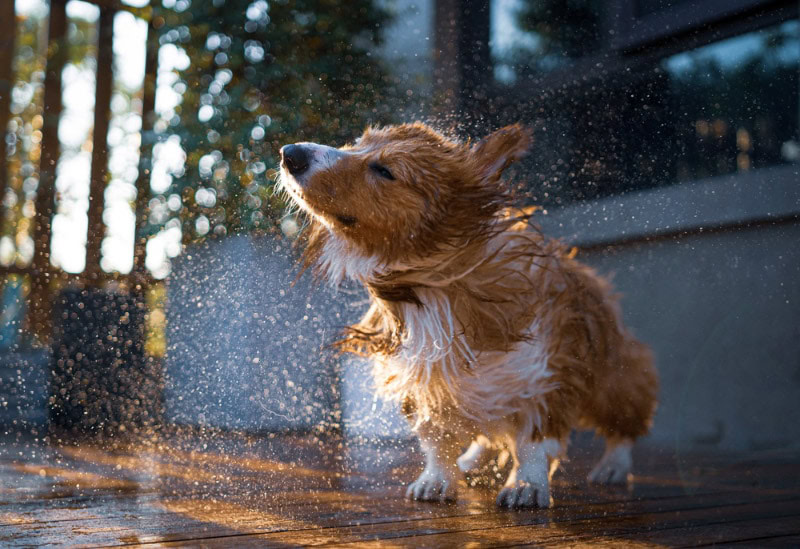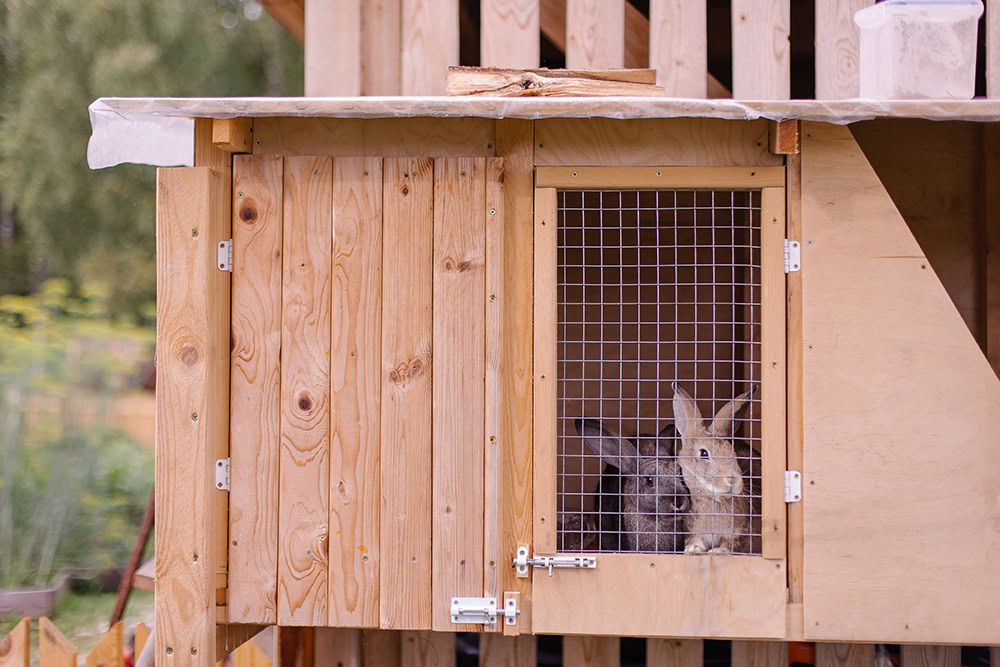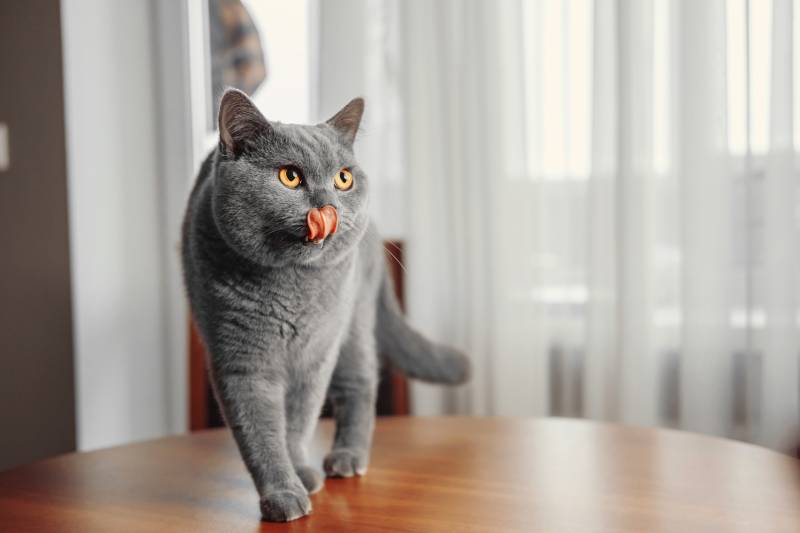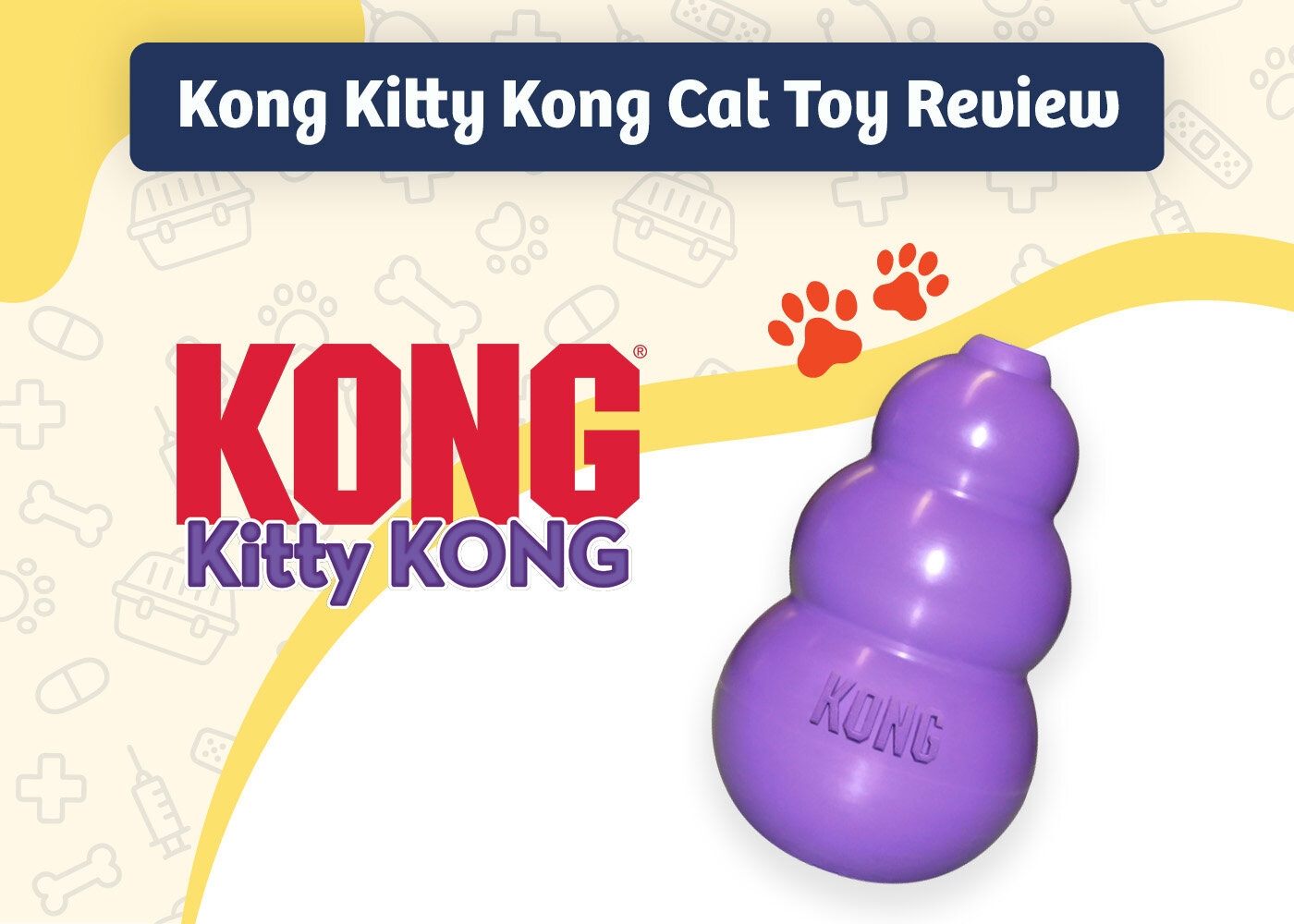VET APPROVED

The information is current and up-to-date in accordance with the latest veterinarian research.
Learn more »Click to Skip Ahead
We’ve all been there: our beloved dog, fresh from a romp in the rain or a much-needed bath, trots back into the house, and suddenly, that unmistakable scent permeates the air – the wet dog smell. This distinctive odor is a common experience for dog owners worldwide, yet its causes remain a mystery to many. In short, the microorganisms that live on your dog’s skin and fur release volatile compounds that become pungent when mixed with water, evaporating from the fur, commonly known as “wet dog smell”. In this article, we’ll delve into the science behind the wet dog smell, explore factors that can heighten it, share strategies to minimize it, and address frequently asked questions about this peculiar scent.

The Science Behind Wet Dog Smell
At the heart of the wet dog smell are microscopic organisms, including yeast and bacteria, that reside on a dog’s skin and fur. These microorganisms are not harmful invaders but part of the natural flora of a dog’s body. As they go about their metabolic processes, they produce volatile compounds, which contribute significantly to the distinctive wet dog smell1.
In addition to these microorganisms, dogs secrete oils from their skin, which serve essential functions like maintaining skin health and giving their coat a glossy sheen. However, when your dog gets wet, these compounds react with water molecules, releasing an odor that adds to the overall ‘wet dog’ smell.
Lastly, volatile compounds produced by the aforementioned bacteria and yeasts are often trapped in a dog’s fur when it’s dry. Once the dog gets wet, these compounds are released into the air due to evaporation, contributing to the strong, unique smell we associate with wet dogs.
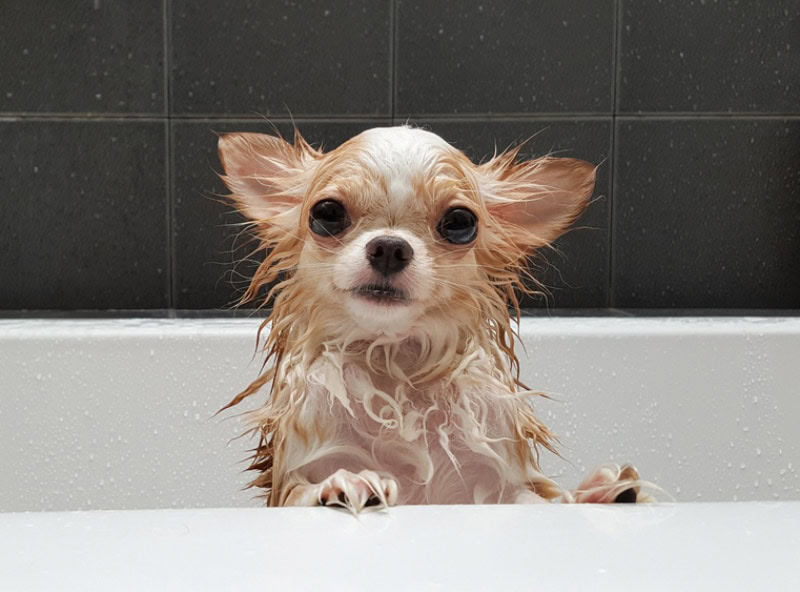
Factors That Amplify the Wet Dog Smell
Certain factors can intensify the wet dog smell. Firstly, the breed of the dog plays a role. Some breeds, such as Basset Hounds, are known for having oilier coats, leading to a stronger smell when they get wet. Dogs that drool a lot, causing their mouth area, lower neck and even paws to be wet most of the time, can also emit an unpleasant smell at times.
Secondly, breeds with excessive skin folds, such as Shar-Peis, Pugs and Bulldogs, often have a stronger odor due to moisture being trapped in these areas, predisposing them to bacterial and yeast overgrowth if not regularly cleaned.
Lastly, certain health conditions, like skin infections, can exacerbate the smell. If you notice a sudden change or intensification in your dog’s smell, it may be worth consulting your vet to rule out any underlying health issues.
Breeds Known for Their Wet Dog Smell
While all dogs tend to have a distinctive smell when wet, some breeds are known for their particularly strong odors. These can include:
That doesn’t mean these dogs are perpetually stinky. It just means you’ll need to keep on top of their hygiene.
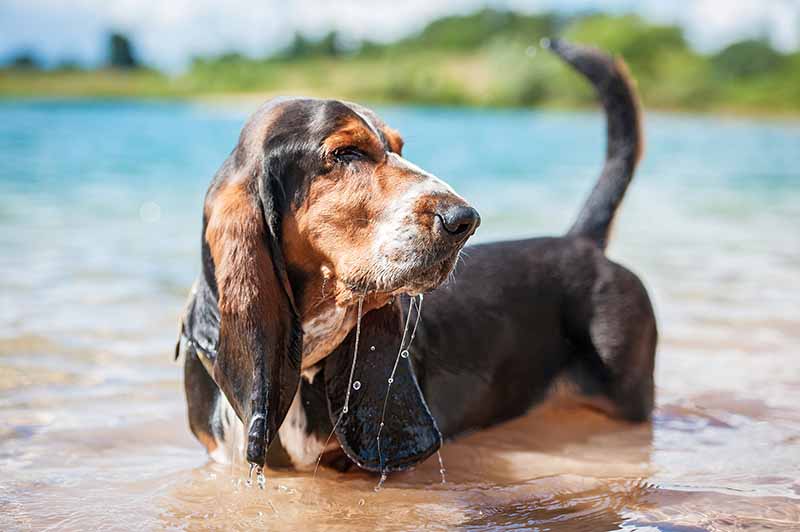
Strategies to Minimize the Wet Dog Smell
Fortunately, there are several ways to keep the wet dog smell under control. Regular grooming, including brushing and bathing, as well as thorough drying off, can help manage the unpleasant smell of a wet dog. Examining your dog’s skin and fur daily and picking up any signs of skin infection early on, as well as consulting with your vet, will help minimize skin irritation and the unpleasant odor that comes with it. If you have a brachycephalic dog or one with excessive skin folds, daily skin fold hygiene with cleaning and drying is crucial.
Feeding your dog a balanced diet that includes high-quality proteins and fats can improve the health of their skin and coat, thus reducing the intensity of the wet dog smell.
You’ll also find there are numerous pet-friendly deodorizing products available on the market. These products, which include sprays, wipes, and shampoos, can effectively neutralize the wet dog smell, keeping your dog smelling fresh. Remember to dry your dog after bathing, and consider using covers on your sofa or their bed to minimize the odor.
There are a variety of effective, pet-friendly grooming products you can use at home to help make cleaning your pet a breeze and keep them smelling fresh. Here are our top picks.
| Image | Product | Details | |
|---|---|---|---|
For Bathing
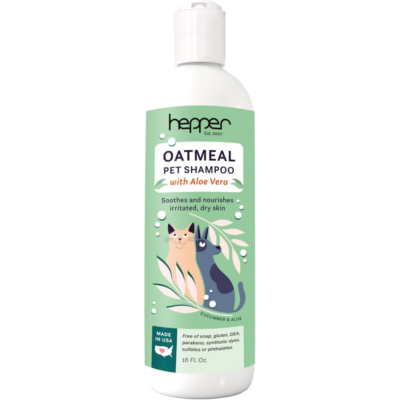 |
Hepper Oatmeal Pet Shampoo |
|
Check Price |
For In-Between Baths
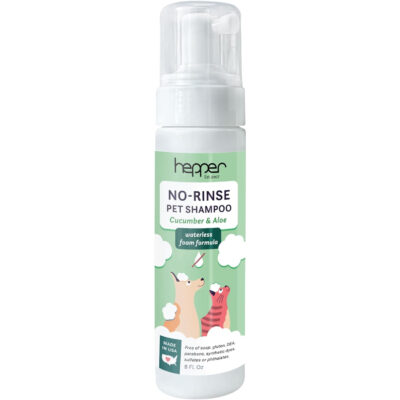 |
Hepper No-Rinse Pet Shampoo |
|
Check Price |
For On-The-Go
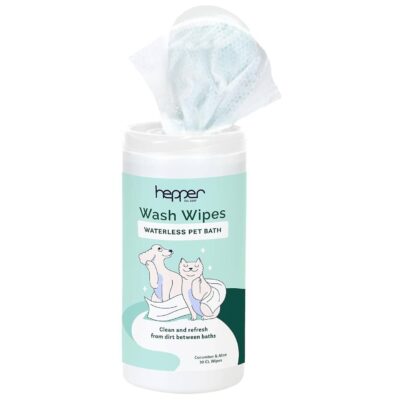 |
Hepper Wash Wipes |
|
Check Price |
At PangoVet, we've admired Hepper for many years, and decided to take a controlling ownership interest so that we could benefit from the outstanding designs of this cool cat company!

Tips for Keeping Your Home Smelling Fresh
To keep your home smelling fresh despite your wet dog, it’s important to take proactive steps. First and foremost, regularly vacuum and sweep floors to pick up any pet fur that may contain odors. Additionally, you can use an air purifier or deodorizing spray specifically designed for pet owners. Dry your dog before letting them come inside the home after a walk, and restrict them to a comfortable area until they are fully dry. Use waterproof bedding or covers to protect the furniture.
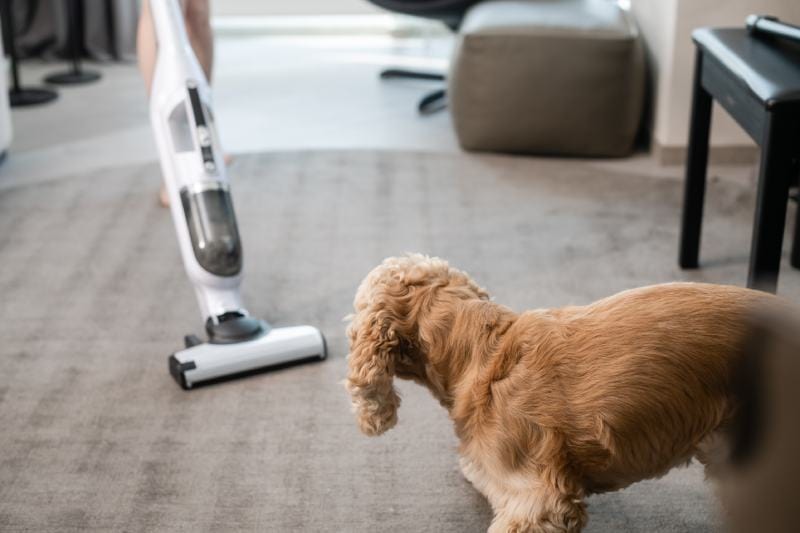
Scents and Products to Avoid When You Have a Dog
When it comes to products, it’s best to avoid heavily scented air fresheners or candles. These may contain potentially harmful chemicals that can irritate your pet’s sensitive nose and lungs. Additionally, try to steer clear of essential oils. Many essential oils are toxic to dogs when ingested, so even if they appear to be effective in masking the wet dog smell, they may be hazardous to your pet’s health. Especially dangerous culprits include tea tree, peppermint, pine, wintergreen, sweet birch, citrus oils, and pennyroyal. When dogs come into contact with these essential oils, it can cause vomiting, diarrhea, difficulty breathing, lethargy, mouth irritation, drooling, tremors, and loss of coordination.
Is Anything I’m Doing Making the Wet Dog Smell Worse?
There are several common habits that may make your dog’s wet smell worse. Frequent swimming in a pool, lake, or ocean can contribute to the smell. Chlorine and other minerals in pool water can interact with the oils on your dog’s skin and fur. Toweling off after a swim is essential for keeping unpleasant odors at bay.
In addition, it’s important to avoid just washing your dog with plain water or shampooing them too frequently. Alternating between a quality canine shampoo and conditioner can help control the smell in addition to keeping your pup’s coat healthy and glossy.

Other Frequently Asked Questions About Wet Dog Smell
Can frequent bathing help in reducing the wet dog smell?
Regular bathing with a mild, pet-friendly shampoo can help reduce the smell. However, too frequent baths can strip the coat of its natural oils, which can lead to skin problems.
Does the environment a dog lives in affect the wet dog smell?
Yes, dogs living in humid or damp environments may have a stronger wet dog smell due to the increased moisture facilitating bacterial growth.
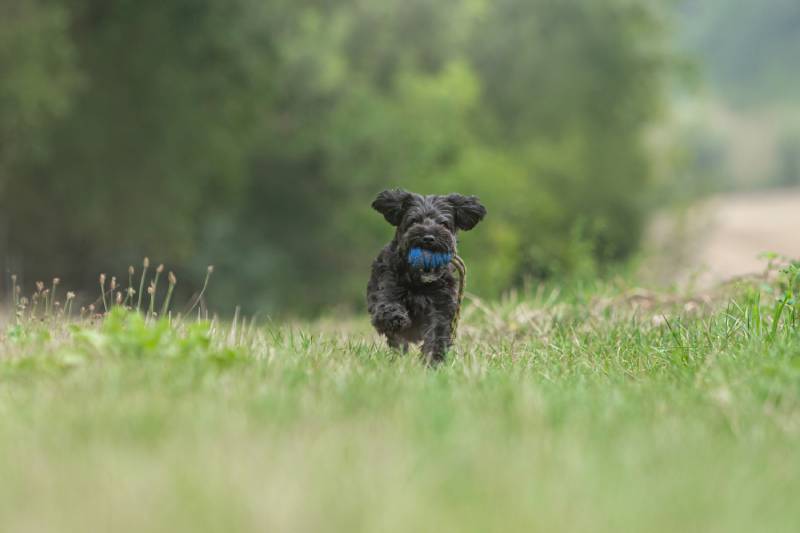
Can neutering or spaying affect the wet dog smell?
Hormonal changes after neutering or spaying may alter a dog’s body odors, but it’s unlikely to significantly impact the wet dog smell.

Conclusion
The wet dog smell is a ubiquitous part of dog ownership. It’s caused by a combination of microorganisms, oils, and volatile compounds present on your dog’s skin and fur. Although it may not always be pleasant, it’s usually harmless. By understanding what causes it and how to manage it, you can ensure a more enjoyable experience for both you and your furry friend. So, the next time your dog comes in from the rain, you will understand the complex biological processes behind that distinctive scent.
Featured Image Credit: Nan Liu, Shutterstock
